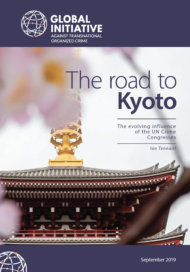Posted on 05 Oct 2023
On 21–22 September 2023, the Global Initiative Against Transnational Organized Crime (GI-TOC) participated in the thematic discussions of the Commission on Crime Prevention and Criminal Justice (CCPCJ) on the implementation of the 2021 Kyoto Declaration, in Vienna. The GI-TOC underlined the issue of political financing as a form of ‘organized corruption’.
The Kyoto Declaration on Advancing Crime Prevention, Criminal Justice and the Rule of Law – adopted at the 14th UN Crime Congress in 2021 – tasked the CCPCJ with organizing thematic discussions to take stock of its implementation through the presentation of data, best practices and lessons learned. The first discussion took place in November 2021 and focused on advancing crime prevention (pillar I of the Kyoto Declaration); the second was held in December 2022 and looked at advancing the criminal justice system (pillar II).
The discussions on pillar III (promoting the rule of law), held in September 2023, covered six themes over two days. On the first day, the themes discussed were access to justice and equal treatment before the law, access to legal aid and national sentencing policies. Effective, accountable, impartial and inclusive institutions; effective anti-corruption efforts; and social, educational and other measures were discussed on the second day.
Most of the time was taken up by panel presentations by UN and member state representatives outlining their governmental or institutional efforts to support the implementation of the Kyoto Declaration. However, a number of civil society participants, including the GI-TOC, were also given the opportunity to present, providing delegates with much-needed independent perspectives and data. (This was the GI-TOC’s first official contribution to an ECOSOC subsidiary body since being granted ECOSOC consultative status in July 2023.)
Ambassador Ugljesa Zvekic, senior advisor to the GI-TOC, spoke on the theme of effective anti-corruption efforts, focusing on the issue of political financing as a form of organized corruption. The GI-TOC has studied this phenomenon extensively in the Western Balkans, and found that the financing of parties and elections leads to political influence and control over state-owned enterprises and public procurement. Progress has been made in regulating and controlling the financing of political parties, but implementation is lacking.
To address these challenges, Ambassador Zvekic recommended a culture of integrity in politics, with stronger political will and oversight institutions; a whole-of-society response to institutionalize the role of civil society in ensuring accountability and transparency; and deep reforms to free public enterprises and procurement processes from political interference.
In its previous analysis of the Kyoto Declaration, the GI-TOC has been vocal about how the challenges of transnational organized crime have not been adequately recognized or addressed, and how the role of civil society participation has been downgraded. Despite the challenges and the limited space available to civil society in this set of thematic discussions, the substantive contributions of civil society speakers were well received.
As the international community looks ahead to the 2026 UN Crime Congress in the United Arab Emirates, the thematic discussions provide a platform to disseminate the latest data and evidence on organized crime and criminal justice, and to highlight the critical role played by civil society in addressing these challenges. In 2024, we can expect a discussion on pillar IV of the Kyoto Declaration (promoting international cooperation and technical assistance to prevent and address all forms of crime). It will be crucial to invite more civil society participants and ensure they have the time to present their perspectives on the urgent need to better understand the challenges and improve responses.



